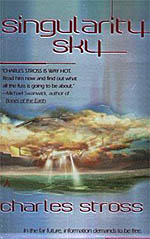
![]() couchtomoon
couchtomoon
4/3/2014
![]()
This 2003 nuclear-steampunk space opera is crammed full of SF tropes and wink-and-nudge political satire. And in case you aren't intelligent enough to sniff out the satire, Stross will bruise your ribs from his incessant elbowing of belabored musings and contrived character debates.
In the future, a mysterious force called the Eschaton has punished Earth for violating time-travel causality laws and relocates most of humanity to colonies throughout the galaxy. By the 23rd century, most of humanity has been rediscovered and efforts are made to reestablish relations. On neo-Victorian Rochard's World, ruled by a technophobic regime, another mysterious presence called the Festival rains cell phones down from space, promising anything in exchange for entertainment. The reactionary government of Rochard's World pursues war with the Festival, while the disenfranchised citizens demand revolution. At the same time, the mysterious employer of Martin Springfield, an engineer from Old Earth, plants him as a mole within the New Republic navy, and UN diplomat Rachel Mansour is sent to spy on the New Republic war tactics in order to prevent causality violations that might further upset the Eschaton. Martin and Rachel spend their time on the ship playing double-agent on board, playing doctor with each other, and then agonizing about getting caught.
Information is King, but Sporks Rule
"The day war was declared, a rain of telephones fell clattering to the cobblestones from the skies above Novy Petrograd." A surprising opening line, which, barring the improbability of cellphones surviving such a fall through the atmosphere (probably Nokias), is an intriguing vision loaded with all kinds of plot-worthy implications. Is it ethical to provide advanced technology to a stifled, immature culture? What impact does the sudden release of technology and information have on a society kept ignorant by oppressive restrictions?
It's a rousing premise, and a timely question 10 years later, when Twitter bans and net neutrality debates pepper the news. Upon reading that opening line, I envisioned Singularity Sky as an epic and complex cultural struggle, an allegory for postmodern revolutionary machinations. Considering the publication date, I expected some post-9/11 influences, conveyed in the form of subtle but artistic politicizing. And I honestly think Stross' intentions might have matched my expectations, but his vision is lost in a mire of irrelevant nonsense executed by superficial characters who feign intelligent discourse amid a floundering spy plot. Instead of artfully complex sociological SF, we get revolutionary… sporks. Yes, sporks. (Is this a reference to something? Does anyone know what I'm missing here?)
And the lead characters' intrigues do little to clarify the plot. Wooden Martin and quirky Rachel are spies, but they aren't really spies, because everyone knows that they are spies. And when they aren't snooping on their quarry, they're dashing into each other's beds, in secret, but not really, because everybody knows that they are sleeping together. Rachel spends a lot of time lying around naked, fretting about Martin, while Martin stews about his feelings for Rachel. Both characters agonize about blowing cover, yet drop bread slices of espionage and romance on every deck of the ship.
It's an inconsistent depiction, as Martin and Rachel are characterized as top-notch moles in their respective organizations, but neither demonstrate enough self-awareness to be credible. Rachel's spy qualifications include biotech-enhancements and a rocket ship suitcase, (because that's how the UN rolls in the future), but for some inexplicable reason, she must endure a period of costumed abeyance before she can reveal her diplomatic badge. Then, Rachel's undercover act continues, despite being a recognized UN diplomat with expressed UN interests to monitor the New Republic's war tactics. Where is this espionage you speak of?
If an inconsistent spy thriller isn't your thing, Stross has generously dappled his neo-Victorian, cyberpunk landscape with elements of gingerbread fantasy and Russian folklore. The Critics, who are kind of like intergalactic barnacles with opinions, don't fully comprehend humanity, so one Critic's attempt to blend in results in a bad Baba Yaga impression. Meanwhile, a talking man-rabbit (mabbit?) leads a group around the evergreen countryside of Rochard's World to locate the colony's Duke-turned-child. Why? Because it amused the author. It serves no other purpose, yet it is the most interesting part of the story.
Singularity Sky tries to be more than a story of disparate mishmash, but it's a feeble effort at sincere commentary, rendered impotent by its cliché-laden implementation. While the revolutionary leader emerges as a mocked and useless effigy (along with the rest of the supporting cast—no gray areas here), Martin and Rachel act as the pseudo-enlightened intermediaries for Stross' opinions on the most shocking and controversial topics ever, such as women's rights, censorship, privacy, diplomacy, and access to information and technology. This practice grows increasingly unbearable through the final act when Stross devotes pages of artificial debate to explain his points-of-view, in case you don't get it when cell phones fall from the sky and spark a revolution in which ignorant people ask for stupid things and the military harnesses time-travel as a WOMD.
Do you get it? Get it now? Wink, wink, nudge, nudge. (Ouch, my poor ribs.)
http://couchtomoon.wordpress.com